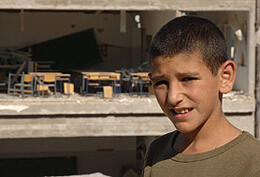United Nations Children's Fund 11 September 2006

A boy in southern Lebanon stands in front of a school building whose outer wall was ripped away during the recent conflict there. (UNICEF/Debbas)
The local high school is unusable after a bomb hit the house next door. A massive crater has dented the ground just a few metres away. The explosion shattered every pane of glass in the building. Exterior walls were blown in and cracked walls lean precariously. The classrooms are full of debris.
The school’s 200 students are wondering how they can resume their education. Isra, 12, spends the day hanging out with her friends on the curbside near the school. There is not much else to do in the town these days.
She doubts she can even look forward to starting class again. “I’m very sad about it,” she says. “I don’t like the idea that I might have to change and go to another school.”
‘Some kind of normalcy’
Initial estimates indicate that up to 50 schools were destroyed and as many as 300 damaged during the recent conflict. Many schools have already postponed the new term, which was to have started in mid-September.
The local high school in the Lebanese village of Srifa is unusable after a bomb hit the house next door. More than half the buildings in Srifa were either damaged or destroyed in the war.
UNICEF is working to ensure that children do not miss any more time in the classroom. “The aim of the back-to-school campaign is to have 350,000 children back to school on October 18,” says UNICEF’s Emergency Coordinator in Lebanon, Philippe Duamelle.
“Schools will also be equipped with various materials, so that schools can function again and teachers can start teaching again as well,” he adds. “This is not only important for the education of these children, but it will also bring back into their lives some kind of normalcy. It’s a way for them to cope with and recover from the traumas they have experienced.”
Classrooms in ruins
Mohammad Nazar is the school principal in Srifa. As he tours the wreckage, he finds that essential school equipment is beyond repair. Computer rooms, science labs and the library are all in ruins. Administrative offices are unrecognizable.
Mr. Nazar desperately wants the school to reopen on time but needs outside help. “All the equipment was destroyed and we found it on the ground,” he says. “And the room and the equipment needs to restored in order for us to start the next academic year in time.”
As Mr. Nazar locks the gate on the ruined school, he can only hope the closure is not for good.
Saudis pledge assistance
Meanwhile, overall hopes for the recovery of the Lebanese education system have received a boost with Saudi Arabia’s announcement that it will pay all fees for state school students in Lebanon for the 2006-2007 academic year.
“We welcome this important initiative, which is amounting around $20 million,” says UNICEF Communication Officer Soha Bsat Boustani. “It will help tremendously families who have been economically affected by the crisis.”
While the Saudi Government will pay all registration fees, adds Ms. Boustani, UNICEF will supply school bags, notebooks and stationery for all 400,000 pre-school and primary-grade children in Lebanon’s public schools - a measure that should lessen the burden on family budgets in the post-war period.
Related Links
